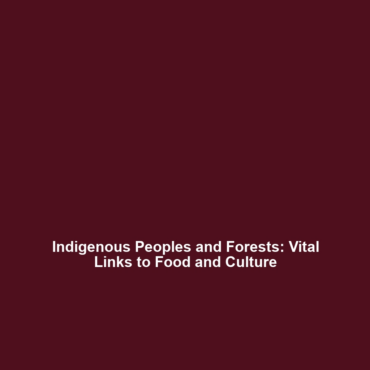The Reliance of Indigenous Peoples on Forests for Food, Medicine, Shelter, and Cultural Practices
Introduction
Indigenous peoples around the world have long depended on forests for their survival and cultural identity, utilizing these vast ecosystems for food, medicine, shelter, and spiritual practices. The intricate relationship between these communities and their forest environments underscores the immense significance of biodiversity. In the context of deforestation and biodiversity loss, understanding how indigenous peoples rely on forests is vital for both conservation efforts and the preservation of cultural heritage. This article delves into key concepts surrounding this relationship, real-world applications, current challenges, and future research areas that highlight the importance of indigenous knowledge in forest management.
Key Concepts
The reliance of indigenous peoples on forests encompasses various key principles that showcase their deep-rooted connection to biodiversity:
- Subsistence Practices: Indigenous communities often engage in sustainable harvesting of forest resources, obtaining food and medicine from their natural environment.
- Cultural Connections: Forests serve as sacred spaces, integral to myths, rituals, and traditions that shape indigenous identities and societal structures.
- Sustainable Resource Management: Indigenous knowledge contributes to biodiversity conservation, promoting practices that uphold ecological balance.
Understanding these concepts is crucial, as the ongoing deforestation threatens not only the survival of these communities but also the rich biodiversity that forests support.
Applications and Real-World Uses
The reliance of indigenous peoples on forests manifests in practical applications that are essential for both cultural preservation and biodiversity conservation:
- Medicinal Uses: Indigenous knowledge has led to the discovery of numerous medicinal plants, many of which hold potential for modern pharmaceuticals.
- Food Security: Wild foraging practices help indigenous communities maintain food sovereignty while contributing to diverse approaches in combating hunger.
- Ecological Restoration: Indigenous approaches to forest management can enhance biodiversity, demonstrating how traditional ecological knowledge aids in combatting deforestation.
These applications highlight how the knowledge and practices of indigenous peoples are crucial in the context of biodiversity loss.
Current Challenges
Despite the invaluable contributions of indigenous peoples to forest ecosystems, several challenges hinder their ability to uphold traditional practices:
- Legal Barriers: Many indigenous communities face legal obstacles that prevent them from accessing their ancestral lands.
- Climate Change: Changes in weather patterns and ecological balance disrupt traditional lifestyles and resource availability.
- Deforestation: Continuous forest degradation threatens not only their resources but also their cultural heritage.
These challenges pose significant issues in addressing the issues related to deforestation and biodiversity loss.
Future Research and Innovations
Ongoing research and innovations seek to further understand and mitigate the impacts of deforestation on indigenous communities:
- Restoration Projects: Collaborative initiatives that integrate indigenous knowledge aim to restore degraded forests.
- Bioprospecting: Research into indigenous medicinal plants can lead to breakthroughs in drug discovery and sustainable health practices.
- Technological Innovations: Next-gen technologies in monitoring ecosystems can empower indigenous communities to manage their resources effectively.
Future innovations and research hold promise for improving the resilience of indigenous peoples amidst the challenges posed by biodiversity loss.
Conclusion
In summary, the reliance of indigenous peoples on forests for food, medicine, shelter, and cultural practices is a vital component of biodiversity. Understanding this relationship is crucial as we navigate the pressing issues of deforestation and biodiversity loss. As we engage with and support indigenous knowledge systems, we contribute to a sustainable future for both communities and ecosystems. For further reading on this topic, consider exploring our articles on sustainable forest management and the impact of climate change on biodiversity.

